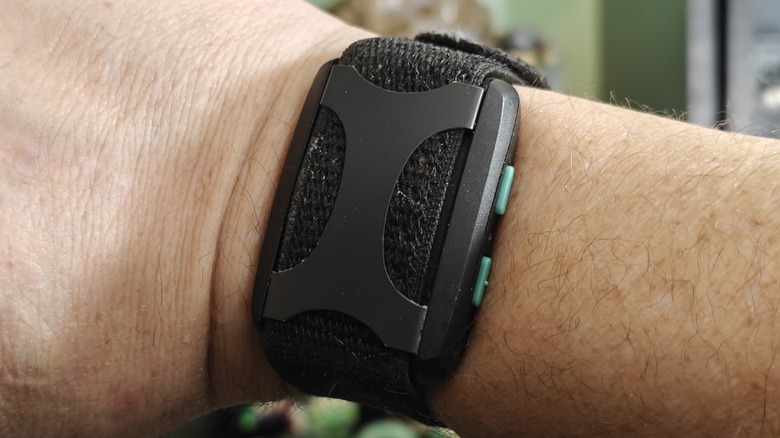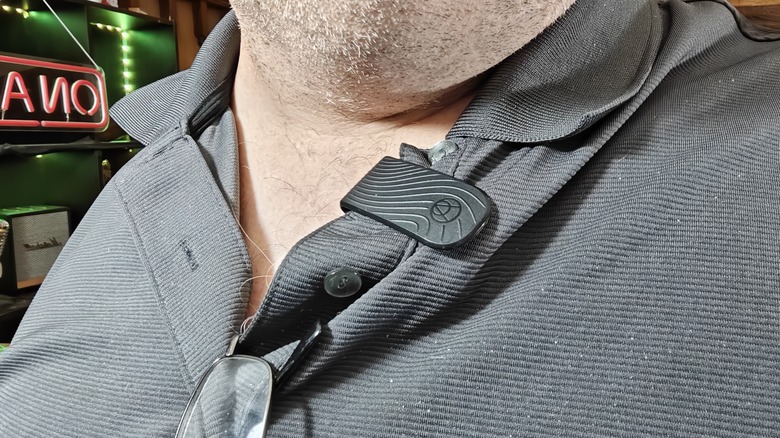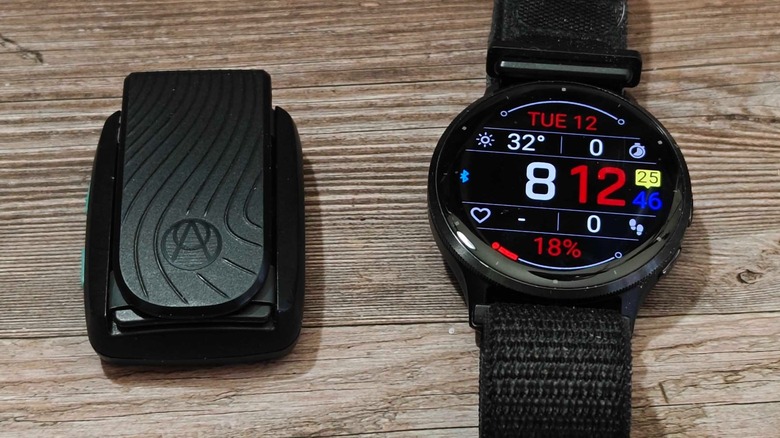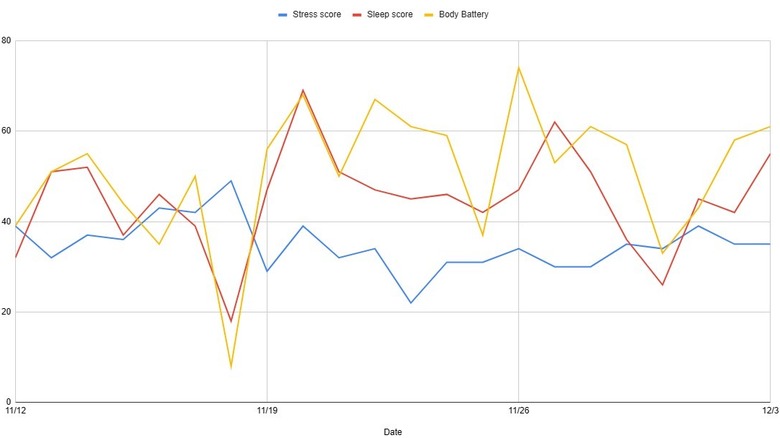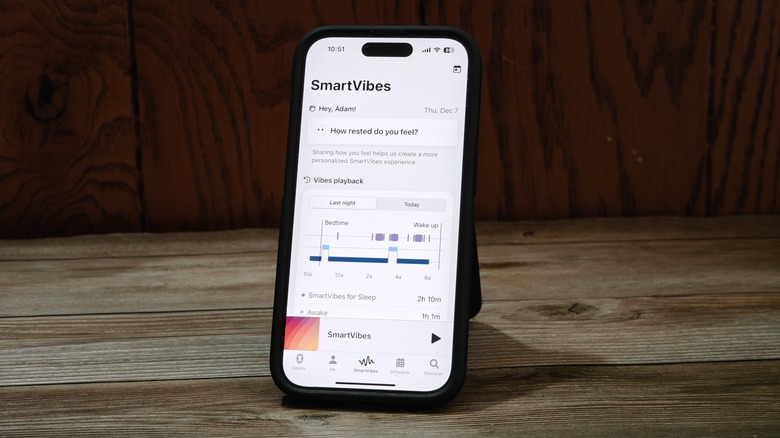Can't Sleep Through The Night? This New Wearable Tech Might Be The Answer
We may receive a commission on purchases made from links.
If you are a person of a certain age, one issue you may run into is the gradual onset of the inability to sleep through the night. You don't notice it's happening until suddenly you look up one day and you're waking up three times every night to take care of your biological needs. Or you wake up because it's Tuesday or for some other equally stupid reason. Whatever the case, sleeping through the night gets harder as you age.
That is an issue I have struggled with for years, so when Apollo Neuro reached out and told me that it might have a solution, I was all ears. Apollo is a wearable that you can wear anywhere you want to — on your wrist, around your ankle, or even clipped to your shirt or waistband. Once you have it on, it vibrates, just like your phone or smartwatch. The difference is the vibrations come at specific frequencies that are designed to signal to your body that things are okay to help you calm down.
The Apollo wearable has been around for a few years, but the company just launched a new subscription service called Smart Vibes that is designed to help you fall asleep, keep you asleep, and even help reduce stress and increase focus during the day using AI. If you're skeptical, so was I, but it wouldn't be an exaggeration to say the result surprised me. First, however, let's examine what the Apollo and Smart Vibes actually are.
What is the Apollo?
Describing what Apollo is, exactly, isn't entirely easy. It's a wearable, but it's not a smartwatch. There is no screen. There is an accelerometer inside the device to detect movement, but that's it. There is no heart sensor or blood oxygen sensor or anything like that. Rather, there's a haptic engine that delivers the vibrations ("vibes") to the user on demand. Using the app you can trigger a vibe for sleep, relaxation, focus, or a few other vibes.
Smart Vibes uses AI to build a sort of user profile so it can deliver those vibes, day or night, without you having to request them. More importantly, the AI will detect when you're starting to wake up and turn itself on to try to lull you back to sleep. As with most AI engines, the longer you use it, the better it works — in theory.
You can wear Apollo on your wrist with the included wristband, or you can remove that and attach a separate clip which you can use to connect the wearable to your shirt. As long as you can feel the vibration (and Apollo Neuro recommends setting the intensity so that you can just barely notice it) you're good to go.
Of course, before we get into whether or not it works, it's important to point out that the Apollo wearable costs $299 on its own and the SmartVibes subscription costs $79.99 per year, so if you want to catch up on your sleep, it's going cost you. So let's get into the data.
Collecting the data
To determine whether or not this wearable works, I had to collect data. Fortunately, another wearable, the Garmin Venu 3, collects a lot of helpful data. Specifically, the Venu 3 will measure your stress levels throughout the day, your sleep through the night, and what Garmin calls the "Body Battery," which is a general readiness score that gives you an idea of how you're feeling. These are the three metrics I collected for three weeks.
For the first week, I did not wear the Apollo wearable so I could set a baseline for my biometrics. After the first week, I wore the Apollo every day and night for two weeks, making sure to run a focus or calming vibe at least once per day, running the sleep vibe at night to help me fall asleep, and letting SmartVibes do the rest.
Every day, I collected my average stress level, average sleep score, and body battery high at the beginning of the day. I always ended up with a body battery of 5 (the lowest score) at the end of every day, but that's because I'm a journalist who generally doesn't get enough sleep. I also haven't tried any apps centered on reducing stress and anxiety. That's on me. However, once I logged it into a chart, the results were obvious and a little surprising.
Here are the results
If you can't tell, I started wearing the Apollo wearable on November 19th, which is right past that precipitous drop in my sleep and body battery metrics brought about by a night of drinking. However, as you can see after that night all three metrics started trending in the right direction. The Sleep score and Body Battery score started going up and the Stress score started going down.
Of course, it's important to note two things here. First, the results do not reflect a major shift in health but rather a subtle change that points to things moving in the right direction. This is not a cure for stress, nor for staying asleep. Rather, this is a tool that you can use to help improve your overall disposition.
Second, it's impossible to determine exactly what caused that shift. Was it psychosomatic? Was it the fact that Thanksgiving was that week and I was looking forward to spending time with family and friends? Was it the end of the technology bomb that is September and October, and finally being able to enjoy a night and a weekend without another looming deadline? It's very possible it was all those things. Still, it's also notable that the shift occurred when I started wearing the device.
Is Apollo the solution?
So does Apollo work? That's the big question. I think the data is there to suggest that it's certainly plausible. In addition to my results, Apollo Neuro conducted a study tracking 1,300 people over two years. According to Apollo Neuro's CEO Kathryn Fantauzzi, people who used Apollo consistently once during the day and then at night got 30 more minutes of sleep. With smart vibes, people started getting up to an hour more sleep per night.
That is a pretty big deal. Between the study and my own data, I'm inclined to believe that there is something here. Anecdotally, I can also say that I have felt less tired overall over the past two weeks which is a change from how I'd felt before. Of course, this is also a small sample size. According to Apollo Neuro, the longer you wear it, the better it gets, so I, for one, will give it the benefit of the doubt and continue to wear it.
If you're like me, and you want to generally feel better, you might want to consider picking one up for yourself. It's not cheap, but it can potentially be transformative, and I'm here for it. If you want to try it for yourself, you can pick up an Apollo wearable on the Apollo Neuro website or on Amazon for around $300.
